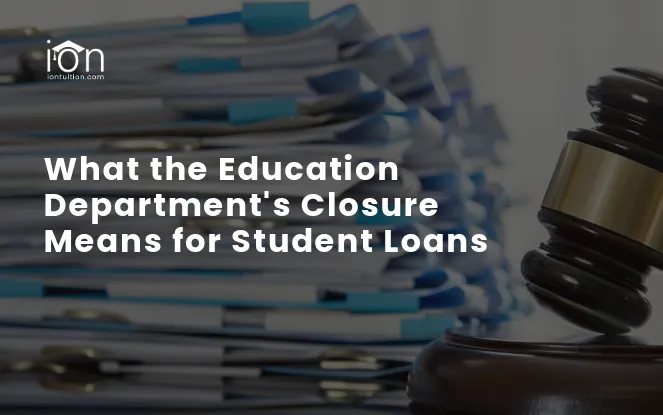The White House issued an executive order to begin the shutdown of the Department of Education. While the full implications remain, colleges can prepare for changes to how federal education programs are administered. With the potential chaos on student loans after the Education Department closure, it is important to understand the changes.

SBA to Manage Student Loan Portfolio
President Trump announced at a recent press conference that the federal student loan portfolio, currently managed by Federal Student Aid at the Department of Education, will be transferred to the Small Business Administration (SBA).
“I’ve decided that the SBA, headed by Kelly Loeffler, a terrific person, will handle all of the student loan portfolio,” the President stated. “We have a portfolio that’s very large, lots of loans, tens of thousands of loans, pretty complicated deal. That’s coming out of the Department of Education immediately, and it’s going to be headed up by Kelly Loeffler, SBA. They’re all set for it, they’re waiting for it, it will be serviced much better than it has been in the past, it’s been a mess.”
It now appears the transfer pertains to the servicing of student loans post-graduation, rather than the initial processing of federal aid applications. This aligns with the President’s previous statements, which also focused on the servicing aspect of the loan portfolio.
The sheer volume and complexity of the federal student loan portfolio present unique challenges, even for the SBA which has experience servicing its own loan programs. Colleges and universities should prepare for potential adjustments in loan servicing procedures and communication channels.
As this situation evolves, IonTuition will continue to provide updates to help institutions.
Federal Student Loan Programs Will Likely Face Disruptions
Linda McMahon pledged to maintain programs like Pell Grants and Public Service Loan Forgiveness during her confirmation hearing as the Secretary of the Department of Education, but changes in oversight could lead to alterations or delays. The White House issued a presidential action earlier this month revising the requirements for PSLF, suggesting that
The Education Department’s staff has been reduced by over 1,000 employees (nearly a quarter of its workforce) due to layoffs and resignations. This could impact new disbursements and/or complicate resolutions for borrower issues.
Communication with Student Loan Borrowers is Critical to Combat the Chaos
Colleges can navigate these changes by adopting a proactive and informed approach. Schools should remind student loan borrowers to repay their debt and refer them to their servicer or IonTuition for support in managing their repayment options.
The current student loan delinquency rate is three times higher than before the COVID-19 pandemic pause and many student loan borrowers are now facing the consequences of negative credit reporting. Borrowers should maintain records of their loans and payments if servicers make errors in tracking or collecting payments.
IonTuition’s student loan default aversion solution helps borrowers stay on top of their repayment and guides them into sustainable plans. Contact us today to implement your default aversion program today!

